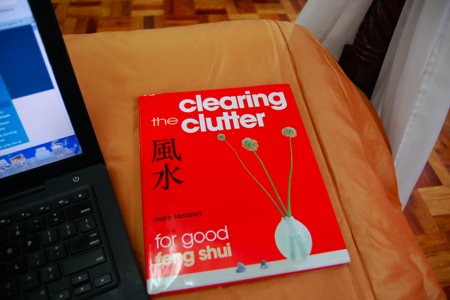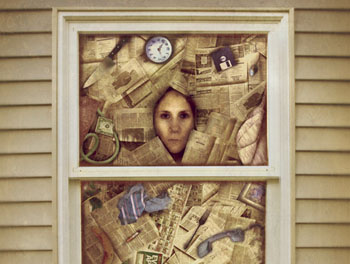
Most Filipinos are quite superstitious as the New Year approaches. One of the prevalent practice to ensure the New Year will be met with wonderful blessings is to de-clutter our home or clean up the mess. I think I have a more or less clutter-free home. Call me a Neat Freak but did you know that You are Your Clutter? In the book “Clearing the Clutter for Good Feng Shui by Mary Lambert, that my sister gave me last month, it says that
Your home is supposed to mirror your inner self, so mess and inactivity reflect something that is going inside you.
The chaos will also make you feel lethargic, stultified and confused about what you want in your life. Once you have emptied your junk hoard, you will feel physically, emotionally, and spiritually liberated and you will have opened the door to wonderful new opportunities.
The superstition of “cleaning up” does indeed bring some logic there. Imagine the wonderful opportunities that await you in 2009.
My mantra each day to the kids are “Clean your mess. Fix your rooms.”. But as much as I want their rooms to be neat, it is not up to my “neat” standards. While their rooms continue to be messy, the rest of my living space is not. Eventually, I hear them say “I need to fix my table. It is a mess”. Hmm, so my “neat freak” mantra seems to be a subliminal message somehow and they start clearing out the clutter in their room without having me around to assist them.
If your clutter is getting you down and you want to start getting rid of it, you are ready to make changes in your life to bring yourself closer to what you want. When I moved in to my new home last year, I got rid of 1/3 of our possessions. Don’t underestimate the effects a clear-out can have on you. It may be painful to get rid of possessions that you have kept for a very long time and feel you cannot exist without them even though an inner voice is telling you to let it go.
I’d like to share with you some tips based on the book above.
How Clutter Obstructs the Flow of Chi
If you can never find the things that you need, it might mean that your house is a mess. Not only does clutter look unsightly, but the constant muddle of so many things makes you feel confused and stressed. The reason for this can be found in the ancient Chinese art of feng shui.
The Chinese believe that there is an invisible life force or energy that flows through all living and non-living things. This energy is called chi. Balancing and manipulating the flow of chi in the home is a major part of feng shui. The chi that flows through the home needs to do so freely in order to have a positive impact on the people who live there. It enters through the front door, moves through the room in a spiraling motion, then finds an exit through a back door or window.
Clutter is the biggest obstacle to a smooth chi flow because it acts like a roadblock that chi cannot easily pass through. When this occurs in the hall, which is considered to be the ““mouth” of the home, it prevents chi from entering at all. If there is clutter all over the house, chi will move sluggishly, which affects the occupants and make them feel stuck in a rut. Feng shui experts who are sensitive to chi usually sense these stagnant areas by a ““sticky” feeling and a stale, musty odor.
When you surround yourself with objects that you often use and love, they emit a strong energy that encourages the normal flow of chi and helps produce an atmosphere that makes your life happy. Loved possessions nurture and support you. Surrounding yourself with unwanted junk or broken items has the opposite effect – their negative energy will only pull you down, and the longer they stay there the worse their effects get. Start by throwing out all objects that have no particular meaning for you, and you might discover that you feel better physically, mentally, and spiritually.

Photo credit
Decluttering Your Home
One of the problems people face when they try to clear out their things is that they feel a strong attachment to some of their belongings. We hang onto memories we associate with objects and that makes us feel secure. While it’s all right to keep some things that remind you of happy times, too many of them will keep new things from entering your life.
There are certain areas of the home that tend to become hot spots of clutter. If these areas become too overcrowded with things, positive energy or chi stagnates and won’t flow throughout your house. Look at these areas of your home and decide whether they need to be cleared out:
The entrance/main hall – This is where your family, guests, and friends pass through and get the first impression of where you live. Ideally, it should be well-lit and welcoming but it is also usually the dumping ground of shoes, bags, children’s toys, and newspapers.
The attic/basement – Not everyone has an attic or basement but if you do, they are usually crammed with junk and things you never use but have not gotten around to throwing away.
Corridors – Clutter in this area usually gathers beside doorways and in wall crevices.
Before you start decluttering, assess which objects you want to throw out and which ones you’d like to keep. Go around the house with a pen and notebook and look at these clutter hot spots, as well as inside closets and bedrooms. Make a note of which areas have huge piles of junk and which have smaller piles.
Once you’re done figuring out where all the clutter in your home is contained, get garbage bags or cardboard boxes and label them according to how you want to dispose of them. Label the first bag as ““junk”, for items that you definitely want to throw away. On the second bag, write ““thrift store” for useful items that still work well and that other people might find a use for. On the third bag, write ““things to be repaired”, for items that no longer work but that you might find a use for. On the fourth bag, write ““things to sort out”, items that you’re not sure you want to let go of. Keep them somewhere for six months and keep the ones that you miss; if not, get rid of them.
When it comes to clothes, be a little more careful – keep only the ones that you enjoy wearing or that you wear regularly. Try on the ones you’re not sure about and if they don’t fit you well or if you don’t like the way they look, get rid of them. Sales and bargains make you buy clothes that you don’t particularly like or need, so make a conscious decision to never again buy items that you’re not 100% happy with.
So what do you think?
Do you believe that by clearing space in your home, you can let go of your past and attract new energy, opportunities and relationships?
I think that keeping the clutter to a minimum can really improve the quality of a person’s life. For me, I feel that it just improves efficiency. Moving about is less hindered because walkways aren’t blocked. It’s easier to access other things because closets aren’t chock full of junk, or tables aren’t full of clutter drowning out useful items and papers. Also, I feel that there’s a sense of peace that comes with being organized. If you need something, you know where it is, because things have their designated places. You don’t worry that something important will go missing, precisely when you need it.
yes i feel so stressed out when my files are a mess. So i fix it first before I start working,
I am a devoted practioner of decluttering – every six months (during the run-up to Christmas/New Year, and before the rainy season begins) – there is a grand cleaning session in which anything that can’t be repaired for immediate use or repurposed, is marked for charity. So not only do you make room for blessings to come into the house, you become a source of blessing for others as well.
Did you ever run across that program “Clean House” that the Lifestyle Channel used to show? That was one of the catalysts for my making regular decluttering a habit. It showed how painfully attached people can be to things with sentimental value, even if it was literally drowning them out of their own bed.
As an interesting example, I managed to resurrect two dinner services out of storage during our last decluttering session; and the holidays are that much more cheerful for having the plates in use at last!
One thing, though: if you share a house with parents, like I do – make sure you only dispose of stuff that is yours and yours alone. You’ll never know when your mama will ask about that hideous sweater she gave you five years ago, and then get mortally offended when she finds out it went to charity – never mind that it stopped fitting you four years back!
Starshadow Rivaulxs last blog post..Twitter Postings
thanks for the insight on disposing stuff. good tips.
Thank you for the tips, Noemi! I’ve been cleaning my room the past few days and clearing some junk, in preparation for the new year. Happy holidays!
that’s good diane. what a good start for a new year.
Thank you for a wonderful topic on Clutter. I so feel that is right the more
house clutter there is the more the body feels drained of energy. I like
to have my living space, room neat and organized. The atmosphere
makes the working area more stable and a calm effect. Once again
thank you for a great topic.
I am currently into blogging also on Feng Shui.
http://www.fengshuiknowledge.blogspot.com
If you think the time to clear your clutter is not time well spent, let me change your mind with feng shui. It will be really easy. Using feng shui to clear your clutter can actually be a very exciting process once you understand what clutter does to your home and to your life. The reason most people avoid clearing the clutter is not because it takes effort and it can be time consuming. The real reason is the fact that clutter clearing is a very emotional process that feels like therapy, and it takes emotional stamina to go through it.
Divide and conquer. The first step to organizing your office is to track the paper trail. Do you really need to keep your daytimer from last year? If you really have a legitimate reason for keeping something, create a folder for it and organize your papers in a file drawer. Anything from more than a year ago that you don’t use should be stored in a clearly labeled box and put in storage or thrown away.